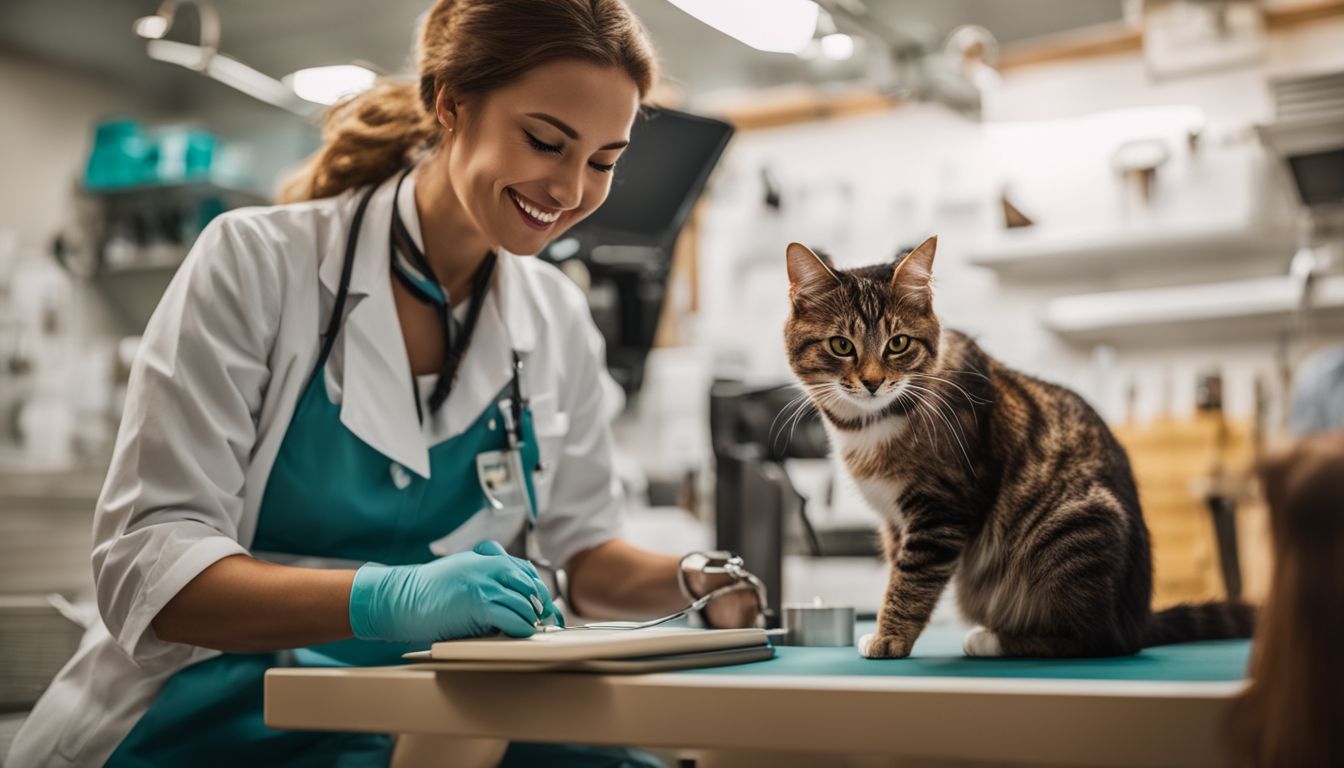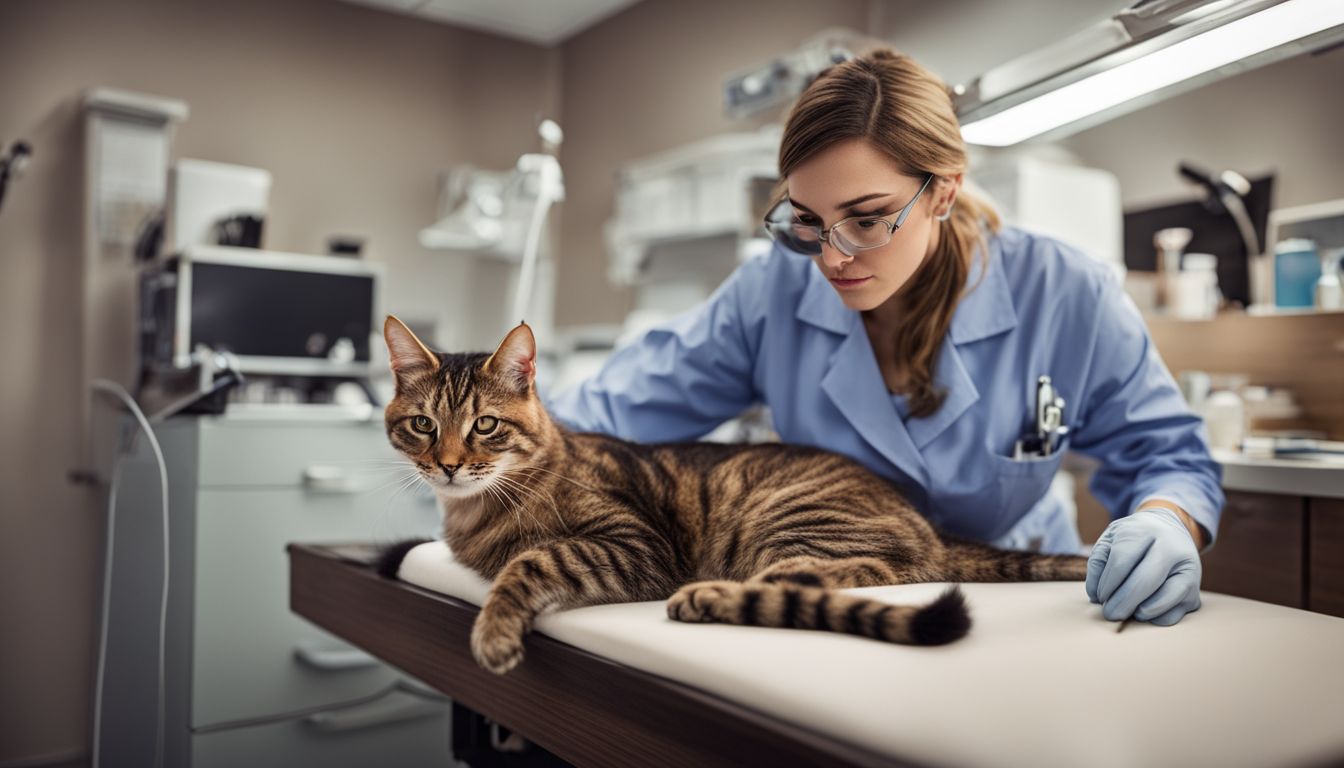
How Often Do You Take A Cat To The Vet? 2023 Guide
Do you often wonder how frequently your feline friend needs a vet checkup? Studies show that regular vet visits are key for maintaining optimal cat health. This comprehensive guide will provide you with all the necessary details on when and why to take your cat to the vet, from kittenhood to senior years.
Get ready to unlock veterinary care insights that ensure your furry pal stays in tip-top shape!
Key Takeaways
- Regular vet visits are crucial for maintaining overall cat health, catching early warning signs, and preventing serious health issues.
- Kittens (under 1 year old) should visit the vet once a month starting at 8 weeks old, while adult cats (1-7 years old) only need to go once a year. Middle-aged cats (7-10 years old) should have 2-3 vet visits per year, and senior cats (10+ years old) should go at least twice a year.
- Changes in behavior, appetite or grooming habits, and weight loss/gain can indicate that your cat needs to see the vet. Common health issues for cats include dental problems, parasites, urinary issues, and obesity.
The Importance of Regular Vet Visits for Cats

Regular vet visits for cats are essential for maintaining their overall health, catching early warning signs, and preventing serious health issues.
Maintaining overall health
Regular vet visits play a crucial role in maintaining your cat's overall health. Veterinarians conduct thorough physical examinations to check for any potential issues that could be detrimental to your feline friend's well-being.
They examine the eyes, ears, skin, and mouth for abnormalities; listen to the heart and lungs; palpate the abdomen and muscles; and sometimes perform blood tests or other diagnostic procedures.
These check-ups also provide an excellent opportunity for preventative care like vaccinations, parasite control treatments, dental cleanings, and nutrition advice. Through these measures, you ensure your cat remains healthy at every stage of its life while also fostering a positive attitude towards veterinary care.
Catching early warning signs
Regular vet checkups play a crucial role in catching early warning signs of potential health concerns. Cats are skilled at hiding illness, making it tougher for owners to pick up on subtle changes indicating issues.
Frequent veterinary visits provide an opportunity for professionals to notice abnormalities in your cat's behavior or any physical transformations that may suggest a health problem.
Early detection of abnormalities enables swift action, potentially preventing minor issues from turning into severe problems. Regular cat wellness exams can pinpoint shifts in weight, detect parasites, and identify dental problems before they become advanced.
Being proactive about your pet's health minimizes discomfort and ensures they live their best lives.
Preventing serious health issues
Routine cat vet visits play a crucial role in preventing serious health issues. Regular checkups allow your vet to spot potential problems early when they are most treatable. Vaccines during these visits safeguard your feline friend from dangerous and possibly fatal diseases like rabies, feline leukemia, and distemper.
Many cats suffer silently from painful dental disease. Your veterinarian can prevent this by performing professional cleanings as well as offering home care suggestions for Cat dental problems prevention.
Furthermore, obesity is another common but preventable issue in cats which can lead to diabetes or joint stress if left unmanaged. Veterinarians provide useful advice on appropriate nutrition for weight management in cats.
How Often Should You Take Your Cat to the Vet?

Kittens (under 1 year old) should be taken to the vet once a month starting at 8 weeks old, while adult cats (1-7 years old) only need to go once a year. Middle-aged cats (7-10 years old) should have 2-3 vet visits per year, and senior cats (10+ years old) should go at least twice a year.
Kittens (under 1 year old): once a month starting at 8 weeks old
Kittens, who are under one year old, should visit the vet once a month starting at 8 weeks old. This frequent schedule ensures their health and development are closely monitored during this crucial stage of their lives.
Regular check-ups help catch any potential issues early on and allow for timely interventions to keep your kitten healthy and happy as they grow. Remember, these monthly visits provide an opportunity for vaccinations, wellness exams, and preventive care tailored specifically for kittens.
Adult cats (1-7 years old): once a year
Adult cats between the ages of 1-7 should visit the vet once a year. Regular check-ups are an important part of maintaining their overall health and well-being. During these visits, the veterinarian will conduct a thorough examination to ensure that your cat is healthy and free from any underlying issues.
Vaccinations may also be given to protect against common diseases. By scheduling yearly appointments for your adult cat, you can catch any potential problems early on and prevent serious health issues from developing.
Middle-aged cats (7-10 years old): 2-3 times per year
Middle-aged cats, between the ages of 7 and 10, should see the veterinarian 2 to 3 times per year. Regular check-ups are essential during this stage of their lives to catch any potential health problems early on and ensure optimal well-being.
These visits allow the vet to monitor their overall health, address any concerns or changes in behavior, and provide preventive care tailored to their specific needs. By maintaining regular veterinary appointments for middle-aged cats, you can help them live a long and healthy life.
Senior cats (10+ years old): at least twice a year
Senior cats, aged 10 years and older, require regular veterinary checkups to ensure their continued health and well-being. It is recommended to schedule at least two visits per year for senior cats.
These visits allow the veterinarian to monitor any age-related changes in your cat's health and catch potential issues early on. During these appointments, your vet will perform a thorough examination, check for signs of common age-related conditions such as arthritis or dental disease, and provide appropriate preventive care.
Regular visits to the vet are crucial for maintaining the overall health of your senior cat and ensuring that they enjoy a comfortable and happy life in their golden years.
Signs That Indicate Your Cat Needs to See the Vet
Changes in behavior, such as excessive meowing or aggression towards others, may indicate that your cat needs to see the vet.
Changes in behavior
Changes in behavior can be an indication that your cat needs to see the vet. Pay attention to any unusual behaviors such as increased aggression, excessive meowing, or sudden withdrawal.
Changes in litter box habits, like urinating outside of the box or straining to go, could also signal a health issue. Don't ignore changes in appetite or grooming habits either, as these could be red flags for underlying problems.
If you notice any of these behavioral changes in your cat, it's important to schedule a vet visit promptly to ensure their health and well-being.
Changes in appetite or grooming habits
Cats are known for their grooming habits and consistent eating patterns. However, if you notice any changes in your cat's appetite or grooming habits, it could be a sign that something is amiss with their health.
A sudden decrease or increase in appetite, as well as excessive licking or neglecting grooming altogether, may indicate underlying issues such as dental problems, gastrointestinal concerns, stress, or even pain.
It is important to keep an eye on these changes and consult with your veterinarian if you observe any unusual behavior in your furry friend. Regular checkups can help catch potential health issues early on and ensure that your cat stays happy and healthy.
Weight loss or gain
Weight loss or gain can be a sign that your cat needs to see the vet. Sudden changes in weight can indicate underlying health issues such as thyroid problems, diabetes, or digestive disorders.
It's important to monitor your cat's weight and consult with a veterinarian if you notice significant fluctuations. They will be able to assess your cat's overall health and recommend any necessary treatments or dietary adjustments to help them maintain a healthy weight.
Regular check-ups are especially important for senior cats who may be more prone to age-related weight changes.
Common Health Issues for Cats
Cats commonly face dental problems, parasites, urinary issues, and obesity.
Dental problems
Dental problems can be a major concern for cats. Poor dental hygiene can lead to serious health issues, such as gum disease and tooth decay. It's important to regularly check your cat's teeth and gums for any signs of trouble, including bad breath, swollen gums, or loose teeth.
If you notice any of these symptoms, it's essential to take your cat to the vet for a dental examination. The veterinarian may recommend a professional cleaning or other treatments to maintain your cat's oral health and prevent further complications.
By addressing dental problems early on, you can help keep your feline friend happy and healthy.
Parasites
Parasites are a common concern for cat owners, as these tiny organisms can cause a range of health issues. Regular vet visits are essential in preventing and treating parasites in cats.
Your veterinarian will conduct thorough examinations to check for the presence of fleas, ticks, mites, or worms. They may recommend preventative treatments such as topical medications or oral medications to keep your cat parasite-free.
By addressing parasite infestations early on, you can help protect your cat's overall health and well-being.
Urinary issues
Urinary issues are common health problems that can affect cats of all ages. These issues can range from urinary tract infections to bladder stones and even urinary blockages, which can be life-threatening.
Symptoms of urinary issues include frequent urination, straining to urinate, blood in the urine, and inappropriate urination outside the litter box. If your cat is experiencing any of these symptoms, it's important to seek veterinary care right away to prevent further complications.
A veterinarian will conduct a thorough examination and may recommend diagnostic tests such as urine analysis or imaging studies to identify the underlying cause of the issue. Treatment options for urinary issues often include medication, dietary changes, and increased water intake.
Obesity
Obesity is a common health issue for cats and can have serious consequences on their overall well-being. It's important to keep your cat at a healthy weight to prevent obesity-related problems such as diabetes, joint issues, and heart disease.
To manage your cat's weight, provide a balanced diet with the right portion sizes and engage them in regular exercise. Avoid feeding too many treats or table scraps as they can contribute to weight gain.
Regular vet checkups will help monitor your cat's weight and allow the vet to provide guidance on maintaining a healthy lifestyle for your feline friend.
Other Factors to Consider
Consider the lifestyle of your cat, such as whether they are indoor or outdoor, as well as any pre-existing conditions or breed-specific health concerns.
Indoor vs. outdoor cats
- Indoor cats have a lower risk of encountering infectious diseases from other animals.
- Outdoor cats have a higher risk of injuries and exposure to toxins.
- Indoor cats are less likely to be exposed to parasites like fleas and ticks.
- Outdoor cats may require more frequent vet visits due to their increased exposure to potential health risks.
Pre-existing conditions
Pre-existing conditions can significantly impact a cat's health and require special attention from the veterinarian. These are health issues or medical conditions that your cat may have had before you adopted them, such as chronic illnesses or previous injuries.
It is essential to inform your vet about any pre-existing conditions as they can affect treatment plans and overall care for your furry friend. Regular checkups will help monitor these conditions and ensure that appropriate steps are taken to manage them effectively.
Breed-specific health concerns
Certain cat breeds may be prone to specific health issues that you should be aware of. For example, Persian cats are more susceptible to respiratory problems due to their flat faces, while Maine Coon cats may have a higher risk of developing heart disease.
It's important to research and understand the potential breed-specific health concerns for your cat so that you can provide proper care and address any issues early on. Regular vet check-ups and open communication with your veterinarian will help ensure that you are proactive in managing these breed-specific health concerns as part of your cat's overall well-being.
Tips for Making Vet Visits Easier for Your Cat
Use a carrier to transport your cat to the vet, ensuring their safety and comfort during the trip.
Use a carrier
Using a carrier is essential for making vet visits easier and less stressful for your cat. Carriers provide a safe and secure space for your feline friend during transportation, preventing them from escaping or getting injured.
It also helps to contain any anxiety or fear they may experience in unfamiliar surroundings. Ensure the carrier has enough room for your cat to turn around and lie down comfortably, with proper ventilation.
Familiarize your cat with the carrier by leaving it open at home and placing treats or toys inside to create positive associations. When it's time to go to the vet, gently place your cat in the carrier and secure it properly before leaving.
Familiarize your cat with the vet's office
Help your cat feel more comfortable at the vet's office by familiarizing them with the environment. Take your cat for short visits to the clinic when they're healthy, so they become accustomed to the sights, sounds, and smells.
Allow them to explore and reward them with treats or playtime in the waiting area. This will reduce their anxiety during future visits and make the experience less stressful for both you and your furry friend.
Bring a favorite toy or treat
Bringing a favorite toy or treat can help make vet visits easier for your cat. By bringing something familiar and comforting, you can help reduce their stress and anxiety during the appointment.
A favorite toy can distract them and provide a sense of security, while a tasty treat can serve as a reward for good behavior. This simple gesture can go a long way in making the vet visit a more positive experience for your furry friend.
Cost of Regular Vet Visits for Cats
Regular vet visits for cats can be costly, but it's an investment in their health and well-being. Want to know how you can affordably care for your feline friend? Read on to find out more!
Options for affordable care
Affordable care options for your cat's veterinary visits are available to help ease the financial burden. Many clinics offer wellness packages that include routine exams, vaccinations, and preventive treatments at a discounted price.
Additionally, some organizations provide low-cost or subsidized veterinary services for pet owners who may be facing financial constraints. It's important to explore these options and discuss payment plans with your veterinarian to ensure that your cat receives the necessary care without breaking the bank.
Importance of budgeting for vet expenses
Budgeting for vet expenses is crucial for ensuring the health and well-being of your cat. Regular visits to the veterinarian can help catch any potential health issues early on, preventing them from becoming more serious and costly down the line.
By setting aside a portion of your budget specifically for vet expenses, you can provide your cat with the necessary preventive care, vaccinations, and treatments they need to stay healthy.
This proactive approach not only saves you money in the long run but also ensures that your furry friend receives the best possible care throughout their life.
Conclusion
In conclusion, regular vet visits are crucial for maintaining your cat's overall health. By catching early warning signs and preventing serious health issues, you can ensure a longer and happier life for your furry friend.
Remember to schedule appointments based on your cat's age and follow the recommended guidelines for routine check-ups. Taking proactive measures will help keep your cat healthy and happy for years to come.
FAQs
1. How often should I take my cat to the vet?
It is recommended to take your cat to the vet at least once a year for a routine check-up and vaccinations.
2. Can I wait longer than a year between vet visits?
While annual check-ups are ideal, if your cat is healthy and has no underlying conditions, it may be acceptable to stretch the intervals between vet visits up to every two years. However, consult with your veterinarian for personalized advice.
3. What happens during a routine vet visit for my cat?
During a routine vet visit, the veterinarian will perform a thorough physical examination of your cat, including checking their weight, heart rate, teeth, ears, and overall health. They may also administer necessary vaccinations or recommend preventative treatments.
4. When should I take my cat to the vet outside of regular check-ups?
You should take your cat to the vet outside of regular check-ups if they show signs of illness or distress such as vomiting, diarrhea, loss of appetite, difficulty urinating or defecating, coughing or sneezing excessively.
5. How much does it cost to take my cat to the vet?
The cost of taking your cat to the vet can vary depending on factors such as location and services required. Routine check-ups typically range from $50-$200 but additional costs may arise if further tests or treatments are needed.







No comments